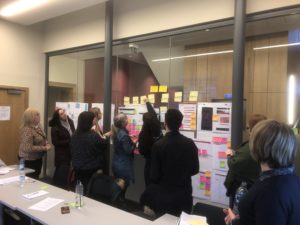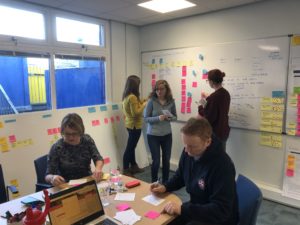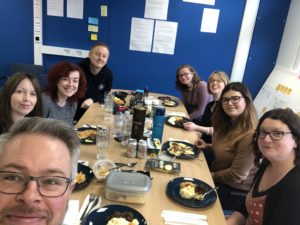Monthly lookback 2: January 2020
January has seen a great deal of focus on working towards delivering the refresh of the Undergraduate Degree Finder, but we’ve also been collating and communicating user research to support upcoming work to improve the postgraduate fees experience.
This post is one in a regular series looking back at recent experiences in our team.
Read more lookback blog posts from Neil
What have we been doing?
We ran one, slightly extended sprint that ended on 30 January. Working in these short bursts with regular review points enabled us to shift focus to almost exclusively on the refresh of the Undergraduate Degree Finder. Our plan in the lead up to Christmas had been to divide time over this sprint and next between the degree finder and the Fees Service, but as the Fees team was working at full capacity already, it made sense to switch our attentions to give them some breathing space.
As such, since we returned after the Christmas break, the editorial team have primarily been focused on liaising with schools, colleges and Student Recruitment and Admissions to deliver the refreshed degree finder. It’s been an intense period of activity but a great learning experience for the team. Taking on this task from Digital Marketing has involved learning a lot of process, building relationships across schools and introducing everyone to a new collaboration and review tool: Gather Content.
Sprint 5 review blog from Cameron Edwards
Undergraduate Degree Finder communications and learning to date
While the editorial focus has been on the degree finder, user research activity has been very much around distilling all that we’ve learned so far about the PGT fees and cost of study experience, so that we’re ready to start tackling the priority issues in the coming sprint:
- Making sense of the range of insight accrued in the previous sprint, and pulling everything together into a coherent picture. This is no small task, as Gayle has been bringing together what we learned from:
- usability tests with students, interviews with school-based admissions staff, observation and interviews with Fees Service staff, email enquiry analysis, website analytics and search analytics
- Organising and delivering a deliver a collaborative playback session with the Fees Service. While I would’ve liked deeper involvement between teams during the discovery phase of our work, this session was most critical as it was here that we ran through everything we’ve learned, and highlighted what we saw as the biggest issues for users – prospective students and staff in schools. We used this session to align our priorities with the Fees Service team so we stand the best chance of delivering improvements that make life better for users, while also hitting the Service’s biggest pain points.
- Running open-invite usability testing review sessions, where colleagues from across the University could join us to watch students attempt to find out what their programme fees were and prioritise the biggest usability issues we saw.

40 colleagues watching prospective students interact with our website.
Website search optimisation is going to be a priority for us over the coming months. I’m keen to integrate improvements into every sprint because:
- Search is used at some point in the majority of prospective student visits to the website
- We have a robust methodology that is straightforward to execute, and an established relationship with Website and Communications in Information Services who manage the search engine service
- There is simply no better activity in terms of return on investment for the student experience
I’ve been focusing on set up of the steering groups that will inform our priorities on an ongoing basis, as I outlined during December’s introductory sessions. During February, I intend to put a call out to the student recruitment and admissions community to gather notes of interest in getting involved with us.
But first, I needed to speak to colleagues who will serve on the executive group to ensure there’s common understanding of our goals. These meetings (with heads of student recruitment in the three colleges, plus colleagues in central functions) have been very positive and productive, and I’m working with Niall Bradley to propose terms of reference for the groups and get initial meetings set up for March.
Find out more about how the steering groups will work in my blog post and video introducing the team
I’ve also been contributing to an options appraisal project for the future of the Degree Finder which is being led by Information Services. The final report is due in early February, so I look forward to being able to share the outcomes next month. In the meantime, I’m encouraging colleagues to review and engage with our vision of future programme-related content management.
Future friendly degree content – read my previous post
Recruitment is ongoing; I’ve been working closely with colleagues in IS Applications Division to secure a software developer for our team. This is a tricky task, as the skills we need are in short supply. This is our second run at recruitment to a really important position in our team, and I’m optimistic I’ll be making an announcement soon.
Blog post promoting our software developer opportunity
What have we learned?
The Undergraduate Degree Finder refresh has been a massive learning experience. Learning from and with schools, and supported by Digital Marketing as we update course-related content for the upcoming recruitment cycle. The process has gone well and we’re on track, but I think it’s fair to say our timings, communications and support will improve next time based on our experiences. And we have more learning to come; once we’ve got through the launch later this month, we’ll undertake a proper review with everyone involved.
It’s been great to see Gayle and members of the team pulling together to make sense of the user research we’ve done around postgraduate fees experiences. The playback session with the Fees Team was reassuring in that what we surfaced correlated with their perceptions, but as is always the case when we do this, the session generated a lot more insight. We got a better understanding of why the Scholarships and Student Funding website is how it is, and why certain services are executed in particular ways. We’re now prioritising improvements with the Fees Team, and will begin delivering changes over the next two sprints that take us into early March.

Colleagues from the Scholarships and Student Funding Team joined us to review our discovery work, and help us prioritise areas for attention in the upcoming sprints
What have we delivered?
The activity that has kept most of the team most busy over the course of January has been the undergraduate degree finder. The vast majority of the exercise – the review and liaison process with colleagues in schools – was finalised in a three week period in January which puts us in a very good place for launch on 24 February.
This turnaround time has been significantly faster than has historically been the case, thanks partly to our new bigger team and our new review tool, Gather Content. But it’s also down to changes in the print prospectus focus, and the tremendous support provided by colleagues in Communications and Marketing, Student Recruitment and Admissions, and most importantly content owners in schools and colleges.
Undergraduate Degree Finder communications and learning to date
We delivered two incredibly popular events, in which colleagues from across the University joined us to review videos of students attempting fees-related website tasks at November’s open day. Their views and priorities have fed directly into our recommendations to the Fees Services about areas for immediate improvement. In total 70 colleagues attended the two usability review sessions, with many more expressing interest through email, bookings to the event waiting list and click throughs to our promotional blog post.
Write up of the collaborative usability testing review sessions
Looking forward to our upcoming sprints, we most importantly delivered our summary of the research we’ve done around Fees experiences. This was done with the whole of the Fees team, and provided them with the opportunity to ask questions about what we’d uncovered and provide extra insight based on their own service experiences. We’re now turning this insight into a prioritised scheme of work and agreeing how our teams will collaborate to deliver website and process improvements.

The team have been converting prioritised issues for students and colleagues that came out of our research into a prioritised backlog of user stories.
We also delivered a team lunch: haggis, neeps and tatties to celebrate Burns Night.

As a: Prospective Student Web Content Team
We want to: enjoy a team lunch of haggis, neeps and tatties
So that: we can celebrate Burns Night together
More lookback blog posts
This post is one in a regular series looking back at recent experiences in our team.
Read more lookback blog posts from Neil



